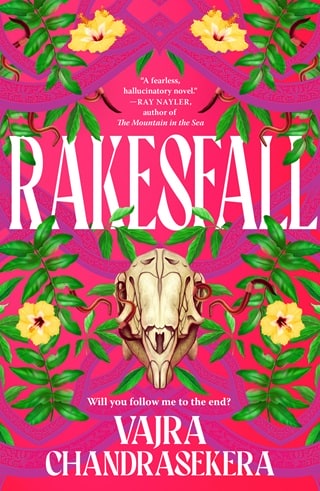Chapter 18 Contingency
After the wars were won, or at least done—after the nuclear dust sowed its wild oats and settled down like carrion birds coming slowly to earth, after the devouring goo ate its fill and stilled into sludge, after the cloud that had ruled the sky for longer than human civilization finally gave way to a long rain, after these and so many other things had happened—on a Wednesday so deep into the desolation that there is hardly anybody left on Earth to remember what a Wednesday is—the Lamb wakes up in her Contingency Bunker, filled with pain and purpose.
Her eyes hurt even in the bunker dark, because the satellites are streaming her visions and status updates before she takes a first step. It's a good step when she takes it, though—confident, precisely calibrated, the silicon carbide nanofibers in her thighs luxuriantly stretching for the first time in (she checks her onboard clock) thirty gigasecs. Was that all? A thousand planetary revolutions, give or take? That seems like not long enough. Still, she is proud of that first step.
The second one is not so good. She tries, midstride, to unlock the bunker door, reaching out almost unconsciously in virtual space, and her processors all spike at once trying to get the decrypt. For a moment the Lamb finds herself thinking only with her squishy organic brain, and something in it is full of terror and unease, rendering it incompetent with her new body. She stumbles, goes to a knee, and recovers gracelessly. She feels self-conscious, but nobody is watching, she tells herself. Probably. The bunker was never fitted with lights; it's an oversized coffin, nothing more. A place for her to be dead in until called upon.
Then the door opens, and she's outside, and the world is vast and full of light. She raises her face to the sky and it shivers like a bubble.
Even though she volunteered for this, it's still terrifying to have done it. To be doing it. She had too little time to acclimatize to her transformed body before she went down for the long sleep, and during the eons of stasis her self-image has traitorously reverted to her unhappy and all-too-human norm. Even her pronoun feels new and strange again. And her legs are too long, and her arms too heavy, and she can't breathe—she isn't breathing—no, that's by design. She feels the sides of her neck for the air filter vents and finds their reassuring corrugations, feels the warm air being processed through them. She is breathing, just not with her face.
Cold natural light lies heavy in the valley below the bunker, like a hungry animal huddling for warmth. She tries to adjust to the satellite-fed sensorium overlay. She's shin-deep in mildly irradiated dust—fimbulwinter's ash mixed with deactivated grey goo—looking around at the empty grey hillside that the Bunker is nestled into, a landscape made blank and empty.
No, that isn't right. She looks again and the soil underfoot is black and fertile, the hillside green and overgrown: a jungle, daylight filtering dimly through the canopy overhead.
The competing visions strobe. She staggers. Her sensorium is stuttering. Her feet are sliding a little—are they really buried in ash or is she just unsteady? She reaches out a hand to rest it on a tree trunk that's flickering in and out of her vision, and is relieved to feel it steady and present under her hand. She narrows her sensorium to the contact of bark on skin. The bark is old, in its fashion—much younger than she is, of course. Perhaps a mere few gigasecs old. The tree is really there, she tells herself. The trunk is thick, forking close to the ground and then forking again, like upreaching arms with fingers buried in green. Leaves bright, rounded, and pinnate. Bark pale and flaking, the wood beneath a smooth pinkish brown. Her fingertips—the whorls are fresh, even her fingerprints changed—scrape up minuscule samples that she brings to her mouth. Pericopsis mooniana, the satellites offer. Long since extinct, they whisper, a ghost tree. But it's her grandfather's voice she remembers, that angry and spiteful man pointing out the names of every tree and shrub as they walked down a forest path oh so long ago. A nedun tree, her grandfather called it, endangered by overlogging and foul modernity. When did it go extinct? And when did it come back? Why wasn't she awakened for that? Were such things not her purpose?
It has been brought back, regardless. The tree exists, the Lamb decides. From the nedun tree outward—her hands tighten on the trunk, her fingers crack the flaking bark and leave dents in the wood—she reconsiders the world. There is no ash on the ground, she decides, there is not ash up to her shins, covering the world, drifting in the still air. At least, there is none now: once, all of this must have been ash. Fimbulwinter is not a fantasy: it is a memory. The satellites are not mad, just stuck in time. Her clock is wrong. Thirty gigasecs is not enough for all this recovery, this ridiculous green fecundity. The world has been cleaned and remade while she slept, and she feels a great sense of loss.
"This was my work," she says out loud, testing her voice. It's an alien rasp. She goes into a coughing fit halfway through the phrase. Her eyes tear up, her mouth fills with spit. She spits. "This was supposed to be my work," she says, and this time it sounds more like a voice, though still an unfamiliar one. There's nobody in sight, but someone must have woken her: a Contingency Bunker needs someone outside it to declare the contingency. That's supposed to be the caretaker's job.
"Caretaker," she says. That was supposed to be a question. She can't remember how to inflect a question with her voice. She tries again. "Caretaker?"
The memory/vision of the dead world is still ghosting in her sensorium, but at least it's relatively featureless. She does her best to ignore it, and it becomes background. A haunting. Memento mori. The satellites whisper to her of a world's-death long since conquered, of radiation and ash and silence. She ignores them. Overhead, there is birdsong. The air is cold. Her Bunker is at low latitude (the hallucinating satellites agree about that, at least) and it shouldn't be this cold. Perhaps residual fimbulwinter effects. Or maybe it's early morning? The light is indistinct through the jungle overstory, and she can't tell. Her clock says it's midafternoon, but if it's wrong about the eon, it's probably wrong about the time of day. It's cold enough for goose bumps on the parts of her skin that were left human enough, the fine hairs bristling on her face and neck and shoulders, up to the clavicles. The engineers called goose bumps an ancestral ambient situational awareness/early warning system that they didn't want to take away completely. Her skin is synthetic dermal armour, meant to protect against the world, a thick collagen lattice in uniform maroon red—is that configurable? She doesn't feel very maroon right now, but she can't find the interface to reset colour. No hair on her head, but transposal antlers like a crown. No nails, but an extra joint on her fingers and toes. No exposed primary or secondary sex characteristics, skin corrugated to protect the torso and hips. No holes, no dangly bits, chest flat. She remembers hating that—not the armour, the flatness, in this body and the last, the boxy, ill-fitting, scarred mess of a bygone age. Well, the scars are gone now and she misses them a little. The body's pain has not faded; she'd thought it the shock of awakening, but it seems to be settling in to wait, aches deep in the bone, recurrent twinges in the nerves.
The path downhill that she remembers is long gone. The satellites suggest climbing the hill, but they think the valley below is buried in ash. She begins to trudge downhill slowly, carefully placing her huge splayed feet, walking three-toed like a rhino, heels never coming down. There is no path, so she makes one, trampling over and through any shrubbery small enough to ignore, circumventing foliage and rocks too big to walk over. Thorns break on her skin. The satellites panic at what they must think her decision to drown in a sea of ash, but as she gets lower and doesn't die, they subside. Perhaps they will reconsider their worldview, update themselves. She isn't going to hold her breath.
When the Lamb gets to the valley and down to the riverside, finally breaking free of the thickest jungle, the caretaker is waiting for her. Sort of. There are nine birds, each one smaller than her hand, with long tails and grey heads, bodies a rufous brown. They are a noisy bunch, cackling to themselves. Ashy-headed laughingthrushes, the satellites whisper to her. Also extinct, of course. It's a relief to hear birdsong, the Lamb realizes; part of her has been scratching at the auditory emptiness of this jungle, the silence of the cicadas. One of the laughingthrushes flies up—it's not much of a flight with its short round wings, more of a hop—and perches on a branch at the height of the Lamb's head. She can tell they are not ordinary birds: her sensorium overlay sees them as a thick mesh of data. Only seven of the birds represent the caretaker, she realizes. The other two are just birds.
"Hello," she says. First contact in deep time, conducted in banal power plays. By speaking first, she is insisting on her language, dialect, period. Let the caretaker calculate the language drift. Given the state of her satellites she doesn't trust them to translate for her. There should be a data backchannel, she remembers, for assistive context. She was drilled on the protocol for making contact, but it's hazy now after her long death. She looks for the backchannel in her imaginarium. It feels like tonguing her teeth to find a loose one. Ah, a wiggle—and then data in a flood. It tastes like salt and iron.
"Hello," the caretaker says. Their name, the backchannel announces, is the Clave Eight. The voice doesn't come out of the laughingthrush's beak, but seems to emanate from all of their bodies at once. The Lamb imagines tiny speakers nestling in the down under the wings. She is almost overwhelmed with the urge to pick up one of the birds in her giant hands, to gently lift their wings and look for the speakers. She controls herself. This could be some godlike manipulation of air molecules. The caretaker is supposed to be the god of this microplate jurisdiction and should be capable of that.
"I only see seven of you," the Lamb says. Making conversation, the phatic chitchat of her strange afterlife. Or is this an invasive question? She feels reckless. Perhaps she isn't controlling herself so well. "Why Eight?"
"This is the eighth generation of our self," the Clave says, after a pause, with a brusqueness that suggests that the question had, in fact, been rude. This is clearly not what they were about to say. The Lamb has them off balance.
"Do the other two know?" the Lamb asks, gesturing at the two civilian birds pecking at the ground. I'm bullying the caretaker, she thinks. She can't stop herself. Some ancient conversational rhythm. She feels it in her spine, the coiled serpent of ancient socializations nestled in her hips, the things she hasn't unlearned: the need to push, to destabilize, to assert herself into space.
"They are innocent," the Clave says, which does not quite answer the Lamb's question. A problem of translation? A cultural misunderstanding? Evasion? She shakes her head. It feels large, heavy; the branching antlers on her head are unobtrusive until she moves her head, and then they remind her they have mass. It seems the Clave is not going to elaborate further. Perhaps she bullied them into a corner, disrupted their chat protocols.
The Lamb shakes her head again, this time conscious of the antlers. "I see my contingency has passed me by," she says. She is proud of this line, of her delivery, that epic world-weariness that can be used only once. It is her first public acknowledgement that her purpose has been fulfilled without her involvement, that thousands of planetary revolutions elapsed without her being called upon, that she is useless now. Her sacrifice was pointless, her dedication a waste. What is left to her but ironic detachment?
The caretaker's backchannel acknowledges her with a thick datastream about the world. It is, as she thought, healing; being healed, in fact, by a maintenance team completely unrelated to the Contingency program. The work is not yet complete, but the radiation is mostly gone; new jungles have been seeded and are growing old again. And her clock is very, very wrong. She has not been dead for thirty gigasecs. Oh, it has been so much longer than a mere thousand planetary revolutions—an order of magnitude more. History is a steep-edged abyss, and she forces herself from the brink of attempting to comprehend it. Her whimpering satellites recede further into the background of her sensorium, abashed by these revelations. The ghostly world of dead ash persists, though fainter than before. She is careful not to give any sign of this to the caretaker.
There are worse things, she supposes, than to go into the long death expecting to wake up into a postapocalyptic, irradiated hell that she would spend her long, long life detoxifying and regreening. Instead she has awoken into retirement, into a paradise where so much of that work has already been done. "I'll retire to a beach," she adds. "I assume there are nice beaches again."
"You were not woken for retirement," the Clave says.
"Of course not," the Lamb sighs. Too easy. "Did my sponsors not pay the bills? Did you need to disassemble my hill to dam the river? Why am I not peacefully dead?"
"Your secondary-tier specializations," the Clave says. "The catalogue listed you as the only available Contingency qualified for international diplomacy, criminal investigation, and exorcism."
"What?" the Lamb straightens up—she hadn't noticed she was hunching. She has nearly four hundred primary-tier specializations, the vast majority related to revisionist terraforming and ecorestoration. She barely remembers her secondary-tier specializations. At the time they seemed more of a joke, the engineers packing the Contingencies with bits and bobs of knowledge to fill in any leftover space on the drives.
"There have been murders," the Clave says. "There's a haunting." The cluster of seven laughingthrushes burst into chirrupping, mocking cackles that never seem to end. The two innocent birds seem startled at first, but then also join the peanut gallery. "Please do the needful and revert."
 Fullepub
Fullepub 



